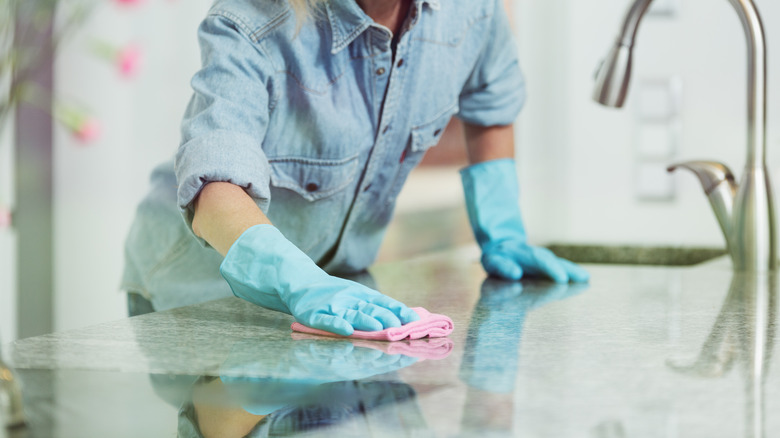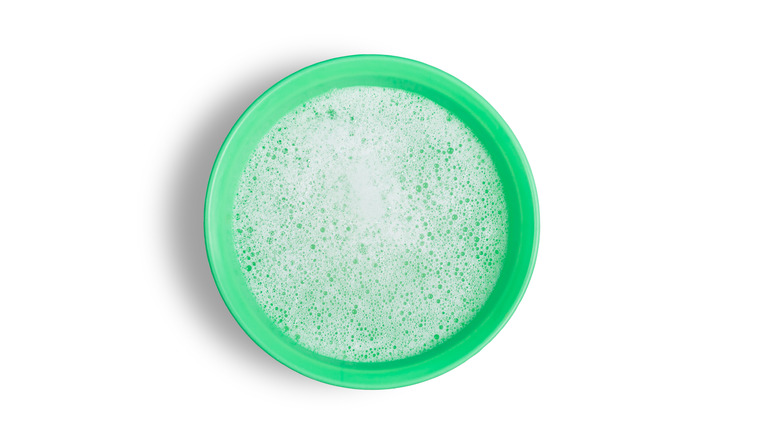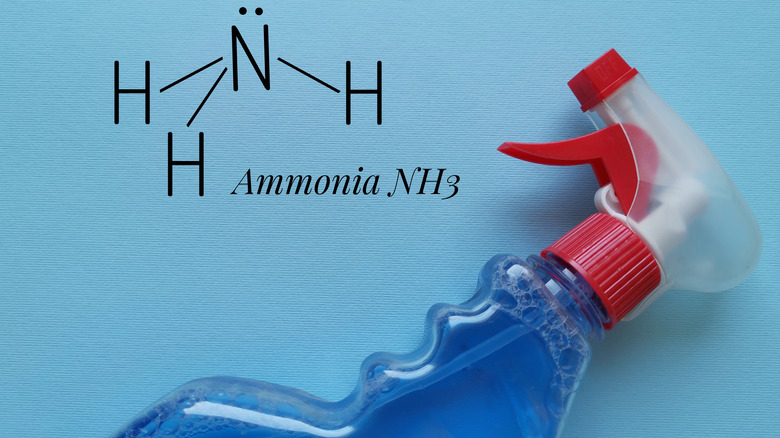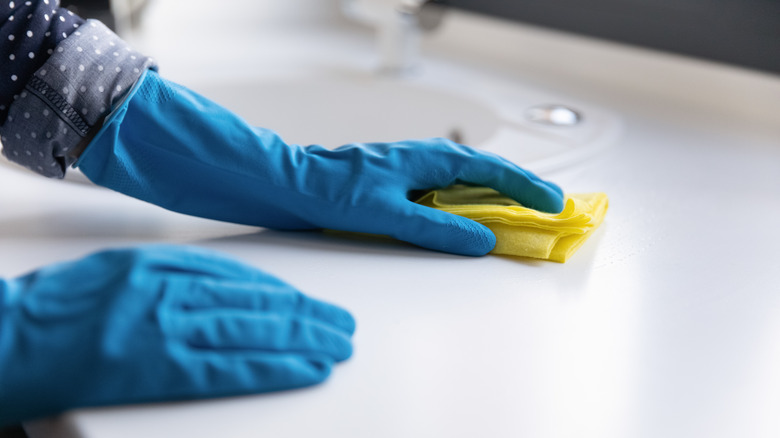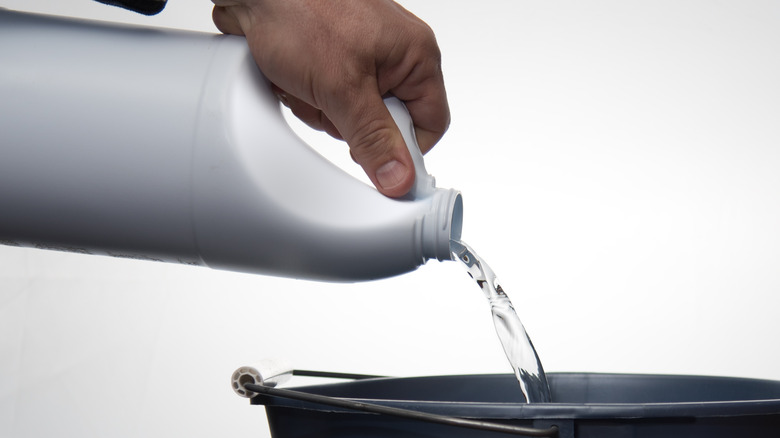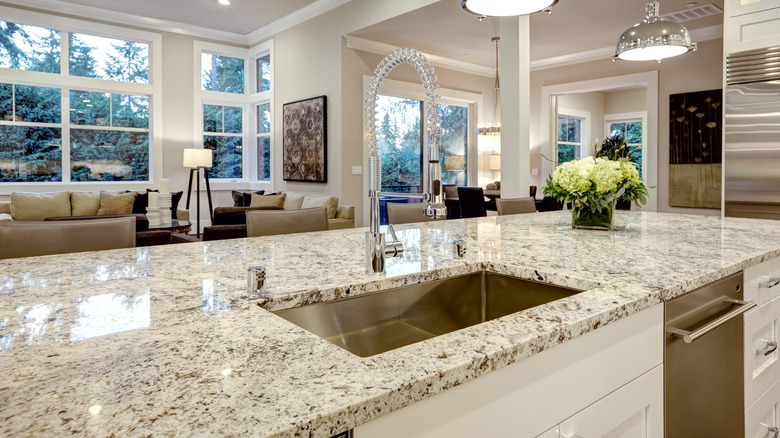5 Easy Ways To Clean Your Corian Countertops
Investing in Corian countertops is a classy way to upgrade your kitchen to include a more chic, durable, and easy-to-clean feature. In fact, the lack of porosity of this solid surface material makes it impossible for dirt to penetrate and create lifelong stains. But here's the thing: Despite how easily these countertops can be cleaned, they are prone to damage when sterilized through the wrong methods (per Rock Doctor). Consequently, their lifespan heavily depends on how you use and clean them.
Using acid drain cleaners, paint stripper chemicals, cleaners with methylene chloride, or even undiluted bleach on this countertop style are some of the easiest ways to ruin them. Hence, knowing the right methods to keep them clean is important. Luckily, the material is durable, so there's quite a lot you can get away with if you clean the countertops correctly and avoid damaging anything. This article explains five of the best ways to clean your Corian countertops.
Clean up residue and dirt with soap and warm water
The accumulation of dirt and residue on your countertops is almost inevitable since a lot of work is done on them. However, cleaning up messes immediately is one way to ensure this surface area doesn't get permanently stained (via The Kitchen Showcase). So, how exactly do you clean Corian countertops when making a mess? Well, the best way is to use warm soapy water. Moderately hot water does a better job at cleaning because the heat can break down more stubborn dirt compared to cool or cold water, according to Ariston.
Using super hot water isn't a great idea, either, as Corian can be damaged by excessive heat (via SF Gate). You'll also want to pair the warm soapy water with a non-abrasive sponge to avoid damage. Use mild dish soap and stick away from cleaning solutions that aren't mild or marketed for Corian surfaces. After washing your countertop clean, use a neat and dry microfiber towel to thoroughly mop up water puddles.
Treat stains with an ammonia-based household cleaner
Spills may be absorbed below a countertop's surface and can even adhere or bond to it. While stains might not penetrate the surface of your Corian countertop, they can cause a discoloration that soapy water won't fix. To eliminate stains, use an ammonia-based cleaner marketed specifically for this solid surface material.
For the most part, you'll need a sponge or dishcloth — and to use some muscle, even though the ammonia will do most of the work. According to Chemical Safety Facts, ammonia is a good cleaner because it breaks down stains and evaporates quickly, making it a good option in your arsenal.
Another suggestion is to use a mildly abrasive pad and cleaner (via Countertop Specialty). Abrasive household cleaners have a scouring effect, enabling them to remove tough stains. If none of these options work, you might have to take a tip from Money Pit by using sandpaper. Note that if you use sandpaper or a mild abrasive, you'll probably leave scratches on your countertop. Luckily, scratches on Corian surfaces can easily be fixed.
Remove hard water marks the right way
Hard water marks occur when water is left to sit and dry on surface areas. However, not all water leaves this evidence behind. Chemistry Cachet states that these mineral deposits accumulate when leftover water contains high concentrations of calcium and magnesium. Hard water has the tendency of causing marks and making surfaces dull and lose their shine. The easiest way to treat it is with a countertop cleaner formulated for these stains.
Cleaning agents are typically easy to use and only require reading and following the instructions listed on the back. However, if you're on a budget or enjoy doing things independently, there are a couple of DIY cleaners worth trying. Academy Marble and Granite recommends using baking soda and water paste, while Classic Quartz Stone recommends using dish soap and steel wood. Remember to rub in gentle and circular motions when cleaning Corian counters.
Disinfect your countertops with a bleach solution
Countertops are one of the most touched surfaces in any home and come in contact with dirty hands and tools all the time. This is one reason Kitchen Seer suggests disinfecting them three times per week. To disinfect Corian countertops, first wear gloves and a nose mask for protection. Next, you'll need to create a bleach and water solution, but be careful, especially if you have asthma. The Centers for Disease Control and Prevention urges mixing one gallon of water with 0.5 ounces of bleach when cleaning countertops.
When completed, use a neat sponge to thoroughly cleanse the surface area with bleach. You might need to repeat the process more than once, especially if it's been quite a while since your last all-out cleaning. After this, all that's left is to dry any excess water with a clean microfiber cloth and enjoy your shiny and disinfected countertops. Here's a word of caution to remember: Do not add ammonia to your bleach, as the combination could create a lethal toxic gas (via the Washington State Department of Health).
Restore its gloss and shine with polish
If your Corian countertops have a semi- or high-gloss finish, understand that several variables can cause them to lose their glory. According to AZ Cabinet Maker, sanding and scratches are some of the most common culprits, but even water residue, letting a stain sit for too long, and the use of harsh chemicals can cause your countertops to dull. When experiencing this, you can restore their shine with the right products and a little effort.
Flintstone Marble and Granite suggests investing in a commercial polish marketed for Corian countertops with a gloss finish. Before applying it, prepare your counters via detailed wiping, disinfecting, and removal of stains with an abrasive pad and cleaner. Next, soak a clean sponge or napkin in water and thoroughly wipe down the surface area. When this is done, dry it with a microfiber towel and then use the commercial countertop polish. Be sure to carefully follow the manufacturer's instructions to avoid further damage.
But what if you're on a budget and aren't ready to purchase a commercial countertop polish? In this case, consider making your own polish. Eagle Stones recommends mixing 1/4 parts vinegar with 3/4 parts water and using a microfiber cloth to polish.
